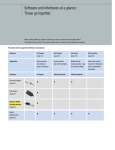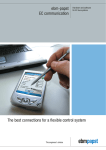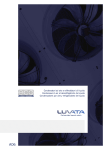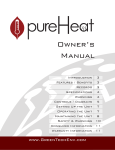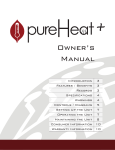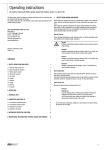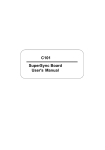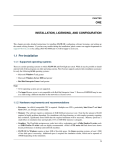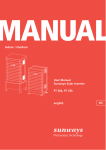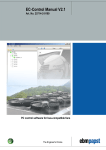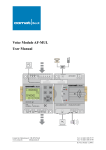Download EC Technology compendium 2011
Transcript
GreenTech EC technology Hardware and software. Technology and application. Commutate electronically, benefit economically The engineer’s choice Symbols that define standards Green through and through In order to underline our philosophy, efforts and achievements when it GreenTech follows a firm philosophy. comes to environmental protection, we have put them all in a nutshell with GreenTech. The benefits of GreenTech mesh with one another from the GreenTech is pro-active development. GreenTech pays off for our customers. initial development of our products through to their use – and they form a circuit that finishes right where it began: with the philosophy that we shall soon build another, even more eco-friendly and economical product. Philosophy: GreenTech is eco-friendly production. GreenTech is acknowledged and certified. Each new development must exceed the economic and ecological performance of its predecessor. Development: Materials, products and processes are selected and designed in an environmentally responsible manner using state-of-the-art methods. Production: State-of-the-art energy, air-conditioning and ventilation technology provides maximum energy efficiency in our plant. Awards: Environmental prizes, distinctions and energy efficiency that beats even the most stringent limits speak for themselves. Application: Our high-efficiency products use GreenTech EC technology and boast enormous energy savings with top performance. For fans with an input capacity of greater than 125 W, the new European Energy-related Products Directive (ErP) to improve energy efficiency will enter into force in 2015 at the latest. Thanks to groundbreaking GreenTech EC technology, all of our ebm-papst fans and motors in these performance classes exceed the ErP Directive even today. 2 Contents As your R&D partners, the economic success of your products is just as important to us at it is to you. Our development of fans, blowers and drive solutions, which are used in a wide variety of industries and applications, is always focused on maximum efficiency. Cost efficiency is the goal, and energy efficiency is one of the most direct ways there! Taking that path also means assuming environmental responsibility. In this brochure, we will show what ebm-papst GreenTech EC technology can do for economy plus ecology – and hence for us all! Claim 4 | 5 Efficiency 6 | 7 Intelligence 8 | 9 Comfort 10 | 11 A holistic approach 12 | 13 Communication 14 | 17 Software 18 | 19 Control 20 | 21 Smartphones 22 | 23 Bluetooth ® 24 | 25 USB adapter 26 | 27 Ethernet 28 | 29 EC Controller 30 | 31 Pressure control 32 | 33 Pressure sensors 34 | 35 Temperature sensors/temperature modules 36 | 39 3 GreenTech EC technology: the original. Not all EC technology is the same. As a matter of fact, many different drive types are categorised under this generic term today, such as PM (permanent magnet motors), ECM (electronically commutated motors) and BLDC (brushless DC motors). ebm-papst was one of the first manufacturers to recognise the economic as well as environmental advantages of EC technology and significantly advanced its development. As early as 1965, we were on the market with the world’s first EC compact fan – 30 years before any other manufacturer. For this reason, GreenTech EC technology made by ebm-papst is the outstanding product of a consistent efficiency strategy – in a manner of speaking, the original among the EC technologies. The pioneer in EC technology: ebm-papst Continuously saving motors Developing and advancing EC technology has certainly been one of our The decisive advantage of fans and motors with GreenTech EC technology most important challenges. The success we have had can be seen today compared to conventional asynchronous motors lies in their significantly in the world’s largest range of EC fans and motors. For over 13 years, higher efficiency of up to 90 % as opposed to 20–70 % with AC motors. mains-powered GreenTech EC technology has been the worldwide standard This means not only better use of primary energy, but also less lost heat in areas such as clean room technology, providing reliable performance and hence a longer service life. 24 hours a day, 365 days a year. The efficiency advantage is ever clearer in partial-load operation, since the With its outstanding position both environmentally and economically, built-in electronics make the EC motors continuously adjustable. This GreenTech EC technology offers comprehensive advantages to beginners means the speed can always adapted to the specific requirements. This is as well as those switching from AC to EC. The topic of sustainability has an advantage which leads to entirely new opportunities for savings in long since become a criterion crucial to making a purchase decision – for many applications, but also provides more comfort – for example by the our customers just as for their end customers. There is no question that significantly reduced noise level. we will continue developing and perfecting GreenTech EC technology in the future, in order to meet the future requirements of our customers, the market and society – but above all also our own convictions. 4 Tremendous energy savings of 30 % on average Future-proof and ready for ErP2015 Hardware and software from a single source Can be used worldwide (due to wide voltage input) Intelligent electronics for numerous control functions Easy 1:1 replacement from AC technology to GreenTech EC technology Over 40 years of experience in the area of EC technology GreenTech as implemented purchase proposition GreenTech EC – the technology that combines the best technologies Moreover, GreenTech EC motors and fans can be used everywhere: They Viewed technically, GreenTech EC technology can be labelled as “soft can be operated in a direct current (DC) as well as an alternating current commutation”. This involves a combination of commutation strategy and (AC) mains (1 and 3 phases). The size is no longer an impediment, either. motor design. The result for the customer is low-noise operation without By having the electronics fully integrated into the motor, many of our EC structure-borne noise. This means that we use permanent magnet motors fans already have exactly the same dimensions as their AC counterparts. in a variety of designs to achieve the best performance for the respective application and the desired power range. The intelligent electronics balance So there is no more reason to rely on conventional AC fans. This applies out synchronisation tolerances, ensuring that all that comes out in the end to more than the development of new applications. The switch from AC are the advantages for our customers. to EC pays off in view of the tremendous efficiency advantages and could not be easier, thanks to plug and play. 5 An average energy savings of 30 %: That is a deal! In ventilation, air-conditioning and refrigeration technology, the world of information technology, heating or building systems. In industrial automation, automotive, or telecommunication. Wherever motors are used for drives or ventilation, energy has to be used as sparingly as possible. Not only the consumer requires this, but also the law with its new directives for limiting energy consumption and protecting the climate. GreenTech EC technology sets a good example: Even today, all of our EC fans exceed the ErP Directive for 2015. And those aren’t just words – it’s a fact! Example: Energy savings in HVAC technology Another fact: Even for changing speeds, the GreenTech EC fan retains its very high efficiency. With AC motors, on the other hand, the already lower efficiency drops significantly. Thus energy savings of over 10 % are attained for condensers/evaporators in which our EC fans work, even at nominal speed. In the continuously controlled range, the relative and absolute savings are substantially greater. Compared to GreenTech EC tech- 29% Savings 6 fans work in one heat exchanger. At an average duty cycle of 75% this means an annual savings potential of over 24 MWh. This corresponds to approx. 14.4 tonnes of CO2 and saves 2,814 euro*. e. g. A3G800 axial fan nology, conventional phase-angle control can use twice as much energy, if not more, depending on the operating point. [W] [W] A small supermarket operates 40 67% 1 800 1 600 AC with phase-angle control AC with transformer AC with frequency inverter ebm-papst EC 1 400 Savings 1 200 fans in the refrigeration counters. The lower intrinsic heating of the energy-saving motor allows a 30 % shorter working time. Over a year, that means a savings potential of more than 9.4 MWh and 5.6 tonnes +650 W +118 % of CO2. Cost saving: 1,080 euro*. +200 W +36 % 6 precision air conditioning units e. g. W1G200 axial fan 1 000 800 600 550 W 400 Pe Pe 200 qV 7 000 Pe = Input power 9 000 11 000 13 000 15 000 17 000 [m3/h] Savings computer centre, each equipped with 3 EC fans. With a duty cycle of 100 %, up to 50 MWh of electricity can be saved. That corresponds to about 30 tonnes of CO2 and e. g. R3G500 centrifugal fan 5,898 euro* every year. q V = Air flow Power input for various control methods Using this formula, you can easily calculate the cost savings for your application. Cs = Rt • Es • Ec Cs = Cost savings (euro/year) Rt = Run-time (hours/year) Es = Energy savings (kW) Ec = Energy costs (euro/kWh) 6 22% are working in the IT rooms of a * With CO2 emissions of 600 kg/MWh (German energy mix) and 11.69 euro cent/kWh, average electricity price for industry in Germany (status: January 2010, source: VEA, BDEW). Best performance under all conditions: That is guaranteed! Just one example for demand-oriented use of fans: the air-conditioning and refrigeration systems of a supermarket. Here one needs full speed and output in the summer at peak load, reduced output in the winter months and whisper-quiet operation at low speeds overnight. These are just examples, but they also reflect real-world conditions that GreenTech EC technology from ebm-papst takes fully into account. With its intelligent open and closed-loop control options, the air-conditioning or cooling systems can be adapted easily to all requirements of manufacturers, owner/operators, consumers, and the general public. With guaranteed high savings potential for energy and costs. Example: Possible power for condensers/evaporators The graphic below, based on the example of size 800 ebm-papst axial fans, makes the difference between AC and GreenTech EC technology clear: Our EC technology can be used in the entire blue range. Moreover, in the dark blue range it has significant power reserves compared to AC technology. GreenTech EC technology allows operation at peak load – with very quiet [Pa] operation. Limit EC 250 Limit AC 200 150 100 Δ Psf 50 qV Psf = Pressure increase 5 000 10 000 15 000 20 000 25 000 [m3/h] q V = Air flow Power range of AC and EC fans AC EC EC power reserves 7 Simply turn down the costs: That’s intelligent! Here is an example of intelligent energy savings from real-world applications: A condenser, as used for example in cooling equipment, is equipped with 4 AC fans and alternatively with ebm-papst GreenTech EC technology. The energy savings possibilities of the GreenTech solution compared to AC fans are considerable – as the graphics below show. Example: Expect considerable savings potential This is a comparison of two condensers, each with four size 800 axial fans: one condenser with conventional AC technology, the other with the innovative GreenTech EC technology. To configure the respective optimal cooling capacity for different cooling requirements, the air performance is adapted to the fans. For the condenser with AC fans, this is frequently done by cutting individual fans in and out by means of external switchgear. The fans that remain in operation continue to run at full speed. The condenser with GreenTech EC fans has a better solution: it does this by continuously adjusting the speed. All fans remain in operation – resulting in substantial energy savings in power input. The graphics below show the possible energy savings and noise reduction in direct comparison of on/off operation and continuous speed adjustment: 100 % dB(A) Power consumption of AC motors Power consumption of EC fans Savings from continuous speed adjustment Benefit of continuous speed adjustment –3 –6 75 % –9 Benefit of continuous speed adjustment –12 50 % –15 –18 25 % Sound pressure level of AC motors Sound pressure level of EC fans Noise reduction from continuous speed adjustment Pe LpA –21 qV 25 % Pe = Input power 50 % 75 % 100 % qV = Air flow Low energy consumption: The bars show the power input of fans that are activated incrementally as needed. The air performance is reduced by 50 % if two fans are shut off. The blue line shows the power input with continuous speed adjustment. 8 qV 25 % LpA = Sound pressure level 50 % 75 % 100 % qV = Air flow Lower noise: While shutting off half of the fans (one-half of the air flow) decreases the noise level by only about 3 dB, speed reduction to one-half the air flow attains an improvement of 15 dB. Our example in numbers: direct comparison between four conventional AC fans in on/off operation and four continuously speed-controlled GreenTech EC fans. The table below shows only the advantage of the power input. By means of the constant higher efficiencies of our GreenTech EC motors, the real energy savings are significantly higher yet again. On/off operation: To adapt the air performance to various cooling requirements, the current practice is still to switch individual AC fans on or off. Modulating operation: All devices and fans remain in operation simultaneously. The optimum cooling capacity is attained via continuous closed loop speed control of all fans. The direct comparison: With closed loop speed On/off operation for AC fans AC Air performance Number of fans in operation speed Power input in kW 100 % 75 % 50 % 25 % 4 3 2 1 100 % 100 % 100 % 100 % 7.40 5.55 3.70 1.85 Modulated operation: closed-loop speed control of GreenTech EC fans EC Air performance Number of fans in operation speed Power input in kW 100 % 75 % 50 % 25 % 4 4 4 4 100 % 75 % 50 % 25 % 6.68 2.84 0.84 0.11 Air performance Reduction of power input control, the power input is decreased substantially: with demand-oriented adaptation to onequarter of the rated output, even up to 94 %. with EC 100 % 75 % 50 % 25 % 10 % 49 % 77 % 94 % Example calculation: Savings potential in kWh: If we assume the Load duty cycle load profile shown to the right, energy demand is decreased substantially in modulating operation. The annual energy demand is reduced by 56 %! Annual hours AC: power requirement with EC: power requirement with mod- per load case on/off operation kWh per year ulating operation kWh per year 876 2,628 3,504 1,752 6,482 14,585 12,965 3,241 5,852 7,464 2,943 193 8,760 37,274 16,451 10 % at 100 % 30 % at 75 % 40 % at 50 % 20 % at 25 % At this load profile, the annual energy consumption is reduced by: 56 % Savings potential in EUR: The use of innovative Savings from EC Savings from EC Savings from EC Savings from EC GreenTech EC technology always pays off for the per year (0.09 €/kWh) per year (0.12 €/kWh) per year (0.15 €/kWh) per year (0.18 €/kWh) 1,874 € 2,499 € 3,123 € 3,748 € owner/operator. Unprecedented: a win-win for the owner/operator and the environment! in real money for every owner/operator, it also conserves precious energy When you use intelligent GreenTech EC technology from ebm-papst, resources. But that’s not all. In addition to the savings effect, you can everybody wins: companies, people and the environment. It not only pays also expect a significant reduction of noise emissions. At lower speeds, off GreenTech EC fans are even quieter. You will hardly know they are there. 9 Minimum noise emissions: That sounds good! Think about air-conditioning in office buildings. Think about heating boilers in residential spaces, range hoods or refrigerators, electronics cooling of computers, ventilation and air-conditioning in the automobile, in commercial vehicles, and on and on. Of course, in all of these applications, function, reliability and safety are everything! Still, the consumer wants to hear absolutely nothing about it – quite literally. Here is something that sounds good: In every application, GreenTech EC fans, EC blowers and Example: Noise reduction at all speeds [dBA] EC drives made by ebm-papst provide perfect power that can barely be heard! ebm-papst GreenTech EC technology is really something to hear – or, actually, not to hear. You hear no motor noise across the entire speed 70 range. The advantage: When demand for cooling is low, such as at night, very A 60 low operating speeds can be selected. The resonance levels typical for frequency inverter operation – which, by the way, are not always eliminated 50 even in our competitors’ EC products – or “phase noise” do not exist in our products, as a different operating principle is involved. 40 B Furthermore, combining AC motors with frequency inverter without an AC with phase-angle control AC with transformer AC with frequency inverter ebm-papst EC 30 Lp A all-pole sinusoidal filter can cause winding and bearing damage. qV 2 000 4 000 6 000 Lp A = Sound pressure level q V = Air flow 8 000 10 000 [m³/h] Noise behaviour for various control methods A: Phase-angle control, hum noise (300 Hz) B: Frequency inverter whistle – motor and device resonance caused by a motor with a frequency inverter 10 Everything included, from the control to motor protection: That’s plug-and-play! Move air – for an all-inclusive price! This is another of the great benefits of GreenTech EC technology from ebm-papst. Whether you’re looking at the PID servo amplifier, radio interference filter, mains filter, motor protection, or current supply for external sensors, our EC products already have all the features they will ever need. Plug and play is this easy: Just do the application check! See for yourself which additional components are required for conventional AC products or even competitor’s products. As you can see below, we have simply ticked all of the features already included in an GreenTech EC fan. Example: Your all-inclusive advantage with a GreenTech EC fan 1 PID servo amplifier 2 Power Factor Controller/mains filter 3 Radio interference filter 4 Motor protection 5 Current supply for sensor Fewer additional peripherals, less installation complexity – and all useful features already built-in and completely inspected. That is how simple GreenTech EC technology is to use in real-world applications. The features in detail: 01 PID servo amplifier: For pressure or temperature regulation, only one corresponding sensor with standard analogue output (0–10 V or 4–20 mA) is necessary. The set value, control range, control function 6 Shielded wires not necessary and control parameters are adjustable. 02 PFC/mains filter reduces current reverse transfers. At rated output, the power factor is typically greater than 0.9. 7 RS485 MODBUS RTU 8 Over-temperature protection 9 Motor current limit 03 The radio interference filter reduces the emission from power-related and broadcast interference voltages and guarantees interference immunity in rough industrial environments. 10 Alarm relay 11 Soft start 12 Connection options 04 The motor protection prevents the motor from being overloaded in all operating states. 05 The current supply for external sensors is fed via the fan. 06 Due to the integration of the commutation electronics in the motor, shielded wires are not necessary. 07 The open protocol standard RS485 MODBUS RTU offers many configuration options for functions, options for customising parameters and integration of the fan in higher-level systems. 08 The over-temperature protection prevents damage to the motor and electronics from an overload. 09 A motor current limit provides additional safety. 10 If there ever is a fault, the built-in alarm relay immediately gives notification. 11 A soft-start function and electronic output limit when the motor starts guarantee that the fan starts smoothly. 12 Numerous connection options, such as for external sensors, offer a maximum of flexibility and embedding options. Intelligent electronics – intelligent power: A GreenTech EC fan already includes everything it will ever need. 11 Fewer types, less logistics: That saves even before installation! GreenTech EC technology replaces AC technology – in the best possible way. This replacement is far superior, not only in terms of energy efficiency, noise reduction and intelligence, but also logistics! After all, you could replace up to 8 different AC axial fans, each with different blade angles, with just a few GreenTech EC axial fans while still providing a fully equivalent replacement. Assume the highest possible flexibility for your applications, even worldwide. Expect fewer types, easy stock-keeping, less logistics – and, in sum, a significantly reduced financial outlay. One instead of many: How to replace AC with GreenTech EC If we consider optimum efficiency and an ideal selection of motor sizes for the respective operative range, then 8 AC variant fans can definitely be replaced by 4 GreenTech EC variants. As the graphics clearly illustrate, 4 EC variants cover the entire blue area, while AC without additional open [Pa] loop speed control can be used on the black curves only. 250 200 150 100 Δ Psf 50 qV Psf = Pressure increase 5 000 10 000 15 000 20 000 25 000 [m3/h] q V = Air flow AC in various blade angles EC Can be used worldwide without any problems ebm-papst GreenTech EC fans feature a wide voltage input. Thus their curve remains practically unchanged over the entire voltage and frequency range. Our fans can be used worldwide, regardless of voltage and frequency. • 3-phase, 200–240 VAC, 50/60 Hz • 3-phase, 380–480 VAC, 50/60 Hz • 1-phase, 200–277 VAC, 50/60 Hz • 1-phase, 115 VAC, 50/60 Hz Each is controllable to the required operating point. 12 GreenTech innovations: That has future! From the ErP Directive for 2015 it is evident: EC technology from ebm-papst is years ahead of its time. No wonder – after all, we were one of the first technology companies to recognise the potential of electronic commutation and continuously advance its further development. To stop now and rest on our laurels would not live up to our claim as an innovation leader in the field of fans and drives. Therefore we continue researching and developing. In doing so, we look not only at the motor itself, but also consider each product as a whole, to exploit all the possibilities of increased efficiency – whether in the materials, the electronic control or the aerodynamics. Here are only a couple examples. We are nowhere near the end There is no question: Our EC technology is the heart of GreenTech, around which, in the truest sense of the word, everything revolves. And that will remain true for a long time to come. Still, our research and development goes on continuously – in all areas of fan and drive technology. This results in innovations that set new benchmarks time and again: The HyBlade® and RadiCal, a revolution in materials Excellent examples of how innovative motor technology and ventilation technology optimally complement one another are our fans with a hybrid material structure: HyBlade and RadiCal. The combination of metal and plastic elements in the axial and centrifugal impellers makes them particularly lightweight and enables aerodynamically optimised design options, which together yield a previously unachieved energy efficiency – and also enable whisper-quiet operation. Biomaterials are the future Increasing efficiency and conserving resources – the holistic approach of GreenTech already begins in the development and production of our motors and fans. Even today we are developing materials made in part of renewable resources, such as wood, to be able to replace a portion of the oil-based plastics in the future. Good for the environment and for your sales proposition. Our plant in Hollenbach not only has many brilliant minds, but also a lot of our GreenTech philosophy. The result: 90 % lower energy consumption during production. A prime example of our holistic thinking – and acting! Electronics that think and save The option of demand-oriented controllability is one of the great strengths of EC technology. For optimum results, however, one also has to know how to use it optimally. Here as well, ebm-papst is showing the way: on the one hand, with a wide range of functions already integrated into all GreenTech EC motors and fans; on the other hand, with a wide variety of connections and interfaces, which offer you nearly unlimited control and network capabilities. But that is a whole different chapter – which begins on the next page … 13 Intelligent electronics with a wide range of functions: That’s a system! Fan networks made up of GreenTech EC fans render their service in refrigeration and air-conditioning technology, in building ventilation, clean rooms and many other application areas. For communication with the bus systems, the ebm-papst product range provides various interfaces and software solutions that give you optimum support for setting up and monitoring your systems. Measuring, open and closed-loop control, automating MODBUS RTU – the reliable standard protocol In addition to their outstanding energy efficiency, the intelligent functions MODBUS RTU for open and closed-loop control are among the chief advantages of ebm-papst GreenTech EC technology. From simply reading out the current Interface RS485 Baud rate* 19,200 bit/s Frame* 8E+1 Data exchange in accordance to ebm-papst MODBUS RTU parameter specification Number of nodes** up to 247 Devices on the BUS all MODBUS RTU-compatible devices Fault detection CRC16 Software support EC Control Fan Control Fan Clone speed to configuring a sensor control, the integrated electronics of our GreenTech EC fans offer numerous options for demand-oriented and efficient operation of systems. Depending on the planned use, application, work environment and existing equipment, various solutions provide reliable control with your GreenTech EC fans. For this purpose, analogue activation options such as 0–10 V and 4–20 mA for a sensor connection and connection for set value device are available, among other things. However, digital control options and complex controls are also possible via a digital bus system (MODBUS RTU). Likewise, external sensors connected to our fan can also be queried remotely. On the following pages, we provide an overview of the combination options for our software and peripherals, such as the Bluetooth wireless standard for configuring and operating our fans, as well as the various communication standards. ** For MODBUS specification 4,0 or higher, other values are also possible. ** For installations with more than 31 fans, RS485 repeaters may have to be used, depending on the type of fan. GreenTech EC technology and MODBUS RTU – your advantages: – Open communication standard recognised worldwide (non-proprietary) – Can be integrated into a centralised energy and data management system – Queries of operating states – Connectivity with other bus systems, e.g. via BACnet, KNX, LON Works and enOcean – Remote query and automation in the network with other MODBUS RTU-compatible devices (actuators and sensors) – Use of existing function libraries – High system and transmission reliability More information about MODBUS RTU is available at www.modbus.org/tech.php 14 Intelligently networked and reliably controlled: This way you have a handle on everything. There is hardly any application for fans in which our GreenTech EC technology with its diverse communication options cannot demonstrate its advantages – to your benefit. Take, for example, the remote monitoring ability via Internet, SMS, e-mail, Bluetooth etc. This makes all information, including speed, motor temperature and operating messages or alarms, available at any time – and, if desired, even anywhere in the world. Remote monitoring – made easy – Running time With state-of-the-art IT infrastructure, the monitoring of functions is carried – Speed/rpm out via MODBUS RTU. The information can be processed and evaluated – Current (intermediate circuit) using MODBUS standard software, but also software such as ebm-papst – Voltage (intermediate circuit) EC Control or Fan Control or software on the customer’s side. – Power input (can be calculated from current draw and voltage) – Emergency operation function There are basically two options for remote monitoring: First, by ebm-papst’s – Temperature of motor proprietary EC Control software on a host computer with an interface – Temperature of electronics converter. The host computer can then be accessed with remote desktop – Temperature of power section software (e.g. VNC, Team Viewer). Secondly, via a laptop that accesses a – Operation mode (control of temperature, pressure and air flow; PLC or a control device. actuator/controller; set value/actual value; cooling/heating) – Operation and alarm display = alarm signal The following parameters are available for optimum energy resource planning, load management, preventive maintenance, control commands Additionally, external sensors connected to the terminal strip of the fans and for troubleshooting and reprogramming remotely: can also be queried remotely. Remote desktop software EC C Interface converter Ethernet Art. No. 21488-1-0174 Art. No. 21489-1-0174 (UL) RS485 (MODBUS RTU) ontr ol Laptop www . Host computer Remote monitoring Approved controller Remote monitoring RS485 (MODBUS RTU) RS485 (MODBUS RTU) Master 15 Communication via MODBUS RTU: That connects! MODBUS RTU has become established as a worldwide standard for controlling actuators and sensors due to its open and simple protocol. We offer a wide range of GreenTech EC fans and motors that support this interface by default. Numerous programmable logic controllers also have a MODBUS RTU interface. This makes it very easy to solve complex automation tasks – typical uses include shopping centres, schools, office complexes, swimming pools and stores such as a bakery or butcher’s shop. For how to interconnect the individual components optimally, refer to the illustration below. Communication on three levels Finally, the “field level” is where the actual actuators work, such as the MODBUS RTU is the ideal basis for the data transfer, in order to integrate GreenTech EC fans and motors from ebm-papst. In addition, there are EC technology in open and closed-loop control processes. This example numerous sensors, which for example measure the ambient temperature shows how the network in a large building complex could look. Here the or the pressure in coolant lines. network’s hierarchy is divided into three levels: The “primary level” is the level on which all data runs together. The heart of the monitoring is the master control system (MCS). All data is collected system. From the stored data, the usage pattern over a prolonged time period can also be analysed and used to project future planning for usage of operating resources. The “field automation level” has the control centres for the various appli- Primary level and analysed here – for general management tasks and for optimising the Master control system e.g. BACnet Building automation control cations: e. g. light, window blinds, air handling units (AHU), condensers Logic Controller). PLCs are automation devices in widespread use which are tailored to the respective application by means of programming. Alternatively, there are control devices (application controllers) that are already designed and programmed for the specific automation task. The control and automation levels can be connected by widely varying bus systems. The bus systems make the process data available to the higher- Field automation level etc. Each of these systems has its own control unit: a PLC (Programmable Input/output light Input/output window blinds PLC PLC Light Jalousie level control level, e. g. a BACnet system. Light sensor Field level Light 1 Motion sensor Light 2 16 Wind sensor 1 Window blinds 1 Wind sensor 2 Window blinds 2 ebm-papst approved controllers: That’s a match. High demands are placed on the control devices for a MODBUS RTU system. For one thing, they have to fulfil their control tasks for the respective application – and those can be very different. For another thing, they have to know all the functions used by the connected actuators in order to use them optimally. For complex automation tasks there is no universal solution, but we have partners who specialise in this task. With our ebm-papst approved controller program, we build the bridge between our products and those of the automation professionals. We not only offer fans, but also enable holistic solutions. ebm-papst approved controllers ebm-papst approved controllers are a perfect match for our EC fans. Here GreenTech EC technology offers a wealth of control, automation and control we distinguish two groups: Programmable Logic Controllers (PLCs) and options. Approved controllers fully utilise these and are available from our control devices (Application Controllers). A PLC is freely programmable, automation partners. while the control device is pre-programmed and configured for certain applications. We have specialised partners for all systems. The advantages of ebm-papst approved con- Database server SMS e-mail Ethernet trollers: – Easiest programming by accessing libraries* – Link to the state-of-the-art IT world (iPad FTP apps, SMS, e-mail, FTP or hardware such as touchpanels, smartphones) – Built-in file server, evaluation and reporting options using Office applications Air handling unit AHU 1 Condenser 1 – Built-in web server, control with web browser is possible – Always a customised solution PLC PLC AHU 1 Condenser * only for PLC For detailed information on ebm-papst’s approved controller program, visit www.ebm-papst.com/controller Pressure sensor GreenTech EC fan Pressure sensor GreenTech EC fan Temperature sensor GreenTech EC fan Temperature sensor GreenTech EC fan MODBUS-RTU 17 Software and interfaces at a glance: These go together. Which control software is suitable for which input device and how do their features differ? The answer is easy to find in the clearly arranged direct comparison on this double-page spread. The perfect match: supported interfaces and protocols Software Application EC Control Fan Control Fan Clone EC Controller (page 20) (page 22) (page 23) (page 30) Service purpose Service purpose Manufacturing – Stand-alone control and stationary and mobile operation system monitoring mobile operation, copy device for refrigeration and archive settings and air-conditioning technology Hardware Bluetooth adapter (page 24) USB adapter (page 26) Ethernet – RS485 interface converter PC/laptop PDA/smartphone PDA/smartphone • • • • • • • (page 28) RS485 MODBUS RTU (page 30) 18 • • Performance features of the control software programs for PCs and PDAs EC Control Fan Control EC Controller Query and modify parameters of one fan • • (•) Modify parameters for group/entire system • – – Group view/floors • (•) – Detailed error history when software runs for long periods • – – Mapping a system layout/floor plan • – – Searching for a fan with an unknown address • • • Setting parameters graphically – • – E-mail on error • – – Support for multiple languages* • • • Support for RS485 ebmBUS • • – Support for RS485 MODBUS RTU • • • Support of Ethernet and multiple subnets • – – Duty cycle display on fan symbol • – – Display of information below fan symbol • – – Illustration of the system in a tree structure • – – Support of multiple configurations in one installation • – – German and English user manual (PDF) • • • Timer • – – Integrated help system (English) • – – Key: • = Performance feature present (•) = Possible in part/to a limited extent – = Not present * The supported languages differ for each product 19 EC Control – our high-performance control program: This way you have a handle on everything! The ebm-papst EC Control program enables detailed control and monitoring of fan groups in ebmBUS and MODBUS RTU networks. The multilingual and intuitively operated interface in the familiar Windows® system environment provides you with easy and logical control. For example, you can position fans on the floor plan of your building in a simple and clearly arranged manner. This lets you always keep tabs on your networks, even if they have many thousands of fans. In version 2.0 you can also expect numerous innovations such as additional languages, expanded help functions, a configuration wizard and a redesigned fan configuration dialogue with extensive self-explanatory categories. This way the system as well as the Ethernet/RS485 interface converter and the fan parameters can be configured easily and conveniently. EC Control software for EC systems EC Control enables visualisation and programming of ebmBUS and MODBUS RTU fan networks and can be configured for USB, serial and Ethernet interface converters. Since Version 2.0, EC Control also supports the Bluetooth adapter. For shorter latencies, multiple interface converters can be connected. The software supports the maximum number of devices allowed by the respective bus system (up to 7,905 fans for ebmBUS and 247 for MODBUS RTU). However, these can be expanded by additional subnet addressing. This makes it possible to use each fan address not just once per system, but also once per interface converter. Thus up to 4 x 247 fans are now supported when using the MODBUS RTU protocol and 4 x 7,905 fans are supported when using the ebmBUS protocol. Where necessary, the variable user interface of EC Control makes it easy Functions to distinguish between the various interface converters. It shows only the – Configuring over 40 fan parameters such as operating mode, set value entries that are relevant to the specific system. Additional features include and control parameters support of a second monitor, a tree-shaped management structure for – Changing fan addresses finding individual fans in large systems efficiently and an online help. – Reading out fan parameters such as actual speed, serial number and production date – Reading out fault status and fault memory – Saving various configurations as an exportable and editable profile – Monitoring installations, including the possibility of reporting failures by e-mail – Administration of multiple systems within one program installation – Support of RS232/RS485 and Ethernet/RS485 interface converters as well as USB and Bluetooth – Simultaneous monitoring of ebmBUS and MODBUS RTU-based installation components (requires several interface converters) – Output of status messages via the USB relay box (Art. No. 10450-1- USB relay box (Art. No. 10450-1-0174) for processing various status messages of fans. 0174) with the option of triggering an external action, e. g. signal lamps – Monitoring of up to 4 x 247 fans with MODBUS RTU systems and 4 x 7,905 fans with ebmBUS systems – Expanded export and import of systems in CSV format with all relevant data – also for exchanging data between operating systems with different language versions 20 System version: EC Control 2.0 System requirements: Item number: 25714-2-0199 – Windows XP Service Pack 3 or Windows 7 Delivery scope: – Approx. 60 MB of available hard drive space; when using the CD-ROM with – Software in DE, EN, ES, FR, IT, NL, FN, JP, CHS (simplified), CHS (traditional), RU – Application manual and operating instructions in DE and EN in PDF format on CD – Quick video guides USB relay box, additional memory is required for its drivers – Monitor with a resolution of at least 1024 x 768 pixels and 16-bit colour depth – CD-ROM drive (only needed during installation) – At least one interface converter of the following types: • Bluetooth adapter (Art. No. 21501-1-0174) • USB (Art. No. 21490-1-0174) • Ethernet (Art. No. 21488-1-0174/21489-1-0174 (UL)) • RS 232 (Art. No. 21487-1-0174 and 21495-2-0174) 21 Control software for smartphones: The best solution when on the move. For wireless programming and monitoring, ebm-papst fans equipped with an RS485 interface can communicate with smartphones/PDAs via the ebm-papst Bluetooth adapter. Diagnostics in the event of fault are likewise possible. To do so, the Bluetooth adapter creates a bi-directional connection from RS485 units to Bluetooth-compatible computers, PDAs and smartphones. The adapter is compatible with the Fan Control, Fan Clone and EC Control 2.0 programs. Fan Control software for smartphone/PDA Fan Control is compatible with both ebmBUS and MODBUS RTU devices. The software has graphical and numerical configuration options and allows you to do an in-fan backup of the current configurations as well as to save two parameter sets, e. g. for daytime and night-time operation. Using an emergency operation function, you can define a set value that the fan defaults to automatically if no bus communication takes place for a configurable time period. Functions – Monitoring of fan groups – Status display of the connected fans – Programming individual fans, e. g. changing the fan’s address – Changing the control mode of the fan (speed control / PWM control / sensor control) System version: Fan Control 3.2 Item number: 25713-2-0199 – Changing set values (speed, direction of rotation etc.) Delivery scope: – Setting closed-loop control parameters (graphically, too) CD-ROM with – Changing minimum/maximum values – German and English manuals in PDF format – Graphical configuration of minimum and maximum PWM as well as set – Installation program (for every language) value, for sensor control (pure P-controller), also the control range – Video setup guide for the Bluetooth connection – Reading out the fault status Languages: Software in DE, EN, ES, FR, IT, NL, FI, JA, CHS (simplified), – Search for unknown device addresses CHS (traditional), RU – Configuring the sensor characteristics for sensor control – Configuring the start-up and run-down ramp (“soft start”) System requirements: – Read out a wide variety of fan parameters – ebm-papst Bluetooth adapter (Art. No. 21501-1-0174), alternative: RS232 interface converter with cable (Art. No. 21500-1-0174) Only MODBUS RTU: – Smartphone/PDA with at least 240 x 320 pixel resolution – Graphical configuration of the curve of the 0–10 V analogue input, – Windows Mobile 5 for Pocket PC or allowing even “off” at 10 V and “maximum duty cycle” at 1 V to be – Windows Mobile 5 Phone Edition or implemented – Windows Mobile 6 Classic or – Reset the fan to the factory settings – Windows Mobile 6/6.1 Premium – Reversing the direction of rotation and 2-sensor control with MODBUS An always up-to-date list of compatible devices is available at RTU protocol version 22 www.ebmpapst.com/downloads Fan Clone commissioning software for smartphone/PDA Fan Clone allows you to efficiently configure variants produced in small lots. After the configuration of one fan is read out and stored, the readout or stored configuration is transferred to other fans, with or without changing the device address of the target fan. Fan Clone also identifies fans with an unknown fan address. Functions The following parameters can be copied onto other fans using this software: – Operating mode (closed-loop speed control/sensor control/PWM control) – Save set value to EEPROM – Source of set values (bus vs. analogue input) – Control function (heating/cooling) Program version: Fan Clone 2.0 – Default set value Item number: 25715-2-0199 – PID controller (with MODBUS RTU, D = 0 is regarded as a fixed setting) Delivery scope: – Maximal speed CD-ROM with – Min./max. PWM – English manual in PDF format – Start PWM – Installation program – Set value 0 and 1 (active with digital interpretation of analogue input)* – Video setup guide for the Bluetooth connection – Reduction factor* Language: EN – Sensor parameters – Run-up and run-down time System requirements – Source for control function (bus vs. external terminal/switch**) – ebm-papst Bluetooth adapter (Art. No. 21501-1-0174), alternative: – Output function of analogue output** – Output curve of analogue output** – Emergency operation function** RS232 interface converter with cable (Art. No. 21500-1-0174) – Smartphone/PDA with minimum resolution of 240 x 230 pixels and Bluetooth interface – Parameter set** – Windows Mobile 5 for Pocket PC or – Enable motor stop** – Windows Mobile 5 Phone Edition or – Analogue input curves** – Windows Mobile 6 Classic or – Source of rotating direction** – Windows Mobile 6/6.1 Premium – Preferred rotating direction** An always up-to-date list of compatible devices is available at – Source of sensor actual value** www.ebmpapst.com/downloads *ebmBUS **MODBUS RTU 23 Bluetooth interface adapter RS485 For wireless programming and monitoring, ebm-papst fans equipped with an RS485 interface can communicate with smartphones/PDAs via the ebm-papst Bluetooth adapter. Diagnostics in the event of fault are likewise possible. To do so, the Bluetooth adapter creates a bi-directional connection from RS485 units to Bluetooth-compatible computers, PDAs and smartphones. The adapter is compatible with the Fan Control, Fan Clone and EC Control 2.0 programs. Nominal data Type 21503-1-0174 Power supply Integrated Li-ion battery Transmitting power Range (depending on ambient conditions) Dimensions Battery operation VDC reversible VDC/mAh mW m mm h 15–28 3.7/2200 1 (Class II) 10–20 120 x 65 x 40 >24 Operating mode RS485, two-wire mode without echo, automatic switchover between send and receive RS485 connection Molex Micro-Fit 4-pole socket (compatible plug: Molex, Art. No. 43025-0400 with 43030-0001) Frequency band ISM band (2402–2480 MHz) Status display over 3 LEDs – Green dual LED (top): voltage OK, device switched on – Green/yellow flashing (existing Bluetooth connection) – Red (middle): Tx, data communication PDA/smartphone → fan – Red (bottom): Rx, data communication fan → PDA/smartphone Housing Plastic housing Type of protection IP 20 Delivery scope – Bluetooth adapter and 4-conductor connecting cable with corresponding Molex plug and core-end sleeves – Integrated battery – 3.7 V power supply pack (can be used worldwide) for charging the battery even without connecting a fan – Product description 24 Connecting the Bluetooth adapter – example of a fan with MODBUS RTU compatibility The Bluetooth adapter is connected directly to the fan. The fan voltage of 15 or 20 V is used for the power supply of the adapter. Note: Reversing the voltage does not present a problem to the Bluetooth adapter. The Bluetooth adapter works in the same licence-free 2.4 GHz frequency band in which wireless LAN networks operate. The frequency hopping method used here provides immunity to interference. Note: Only one Bluetooth adapter is needed for communication with a system, no matter what its size. 1 External sensor Pressure sensor, temperature sensor Power supply Fans Power supply Bluetooth adapter MODBUS RSA/RSB PDA/smartphone ebm-papst Bluetooth adapter Art. No. 21503-1-0174 2 L2 KL1 L3 PE L1 Aout Din1 NC Ain2 I Ain1 I NO +20 V +10 V COM GND Ain2 U GND Din3 RSB Ain1 U Din2 KL2 RSA KL3 2 Bluetooth adapter connection PE 1 Example terminal assignment for fan RSA RSB GND +20 V 25 USB adapter RS485 The ebm-papst USB RS485 adapter connects RS485 devices to a computer. This also requires the ebm-papst EC Control software version 2.0 or later. The USB drivers required for operating the adapter are also included here. Nominal data Type 21490-1-0174 Power supply Dimensions Current supply VDC mm mA 5 (via USB) 56.0 x 31.2 x 24.5 100 (via USB) Operating mode RS485, two-wire mode without echo, internal termination with terminating resistor (preconfigured) RS485 connection – 2-wire – Up to 32 bus nodes – Max. cable length 1,200 m (at 9,600 bps), 1,000 m (at 19,200 bps) Data rate Up to 3 Mbps Isolation 2,500 V (over-voltage protection) Status display Via LED – Green: Rx, receive – Red: Tx, send – Yellow: power ON Housing Plastic housing Delivery scope – Adapter – Pluggable screw terminal – USB cable 26 Connecting the USB RS485 adapter using the example of a fan with MODBUS RTU compatibility The device is connected to a USB port of your computer using the accompanying USB adapter lead. After connecting it, the yellow LED illuminates. Note: Before connecting to the USB port, please install the USB drivers. These are included in the EC Control software (Art. No. 25714-2-0199). Connection to the RS485 bus: Clamp the A and B wires of the RS485 bus to the screw terminal and plug this into the adapter. 1 External sensor Pressure sensor, temperature sensor Laptop Power supply Fans MODBUS RTU RSA/RSB USB Interface converter Art. No. 21490-1-0174 2 1 Example terminal assignment for fan L2 L3 L1 PE Aout Din1 NC Ain2 I Ain1 I KL1 X NO +20 V +10 V PE COM GND Ain2 U GND Din3 RSB Ain1 U Din2 KL2 RSA KL3 2 Interface converter connection A B A = RSA B = RSB 27 Ethernet interface converter RS485 This interface converter permits bi-directional connection of RS485 units and Ethernet-compatible computers or laptops using the EC Control software (Art. No. 25714-2-0199). Nominal data Type 21488-1-0174 / 21489-1-0174 (UL version) Nominal voltage and plug-in supply unit Power supply Current draw Frequency Ambient temperature (arranged in series) Ambient temperature (not arranged in series) Dimensions VAC VDC mA Hz °C °C mm 100–240 12–48 85 50/60 0 to +50 0 to +60 105 x 75 x 22 Operating mode RS485, two-wire mode without echo, automatic switchover between send and receive Safety Electrical isolation between Ethernet and RS485 Electrical isolation Min. 500 V Ethernet connection 8-pole RJ45 socket 10/100 Mbps autosensing RS485 connection 9-pole SUB-D plug Protocols used – TCP – Telnet Status display Via LEDs – Green (left): power supply – Green (right): data communication – Red: fault Housing Plastic housing Type of protection IP 10 Installation Standard rail mounting in accordance with DIN EN 50022-35 Delivery scope – Interface converter – Plug-in supply unit – RS485 cable, D-Sub to screw terminal – Network cable (crossover, Cat 5) – German and English product description 28 Connecting the interface converter (Ethernet) – example of a fan with MODBUS RTU compatibility The Ethernet interface converter serves to integrate bus-compatible EC fans into existing computer networks. This increases the spatial independence of the control room and fans. Other than a power supply, all that is needed is a static IP address, which can be assigned easily using the EC Control software. Multiple Ethernet interface converters can be used without any problems. This allows, for example, larger systems to be divided up spatially to reduce latencies. Note for large systems: For 31 or more fans, an additional repeater is required, to which another 31 fans can be connected. 1 External sensor Pressure sensor, temperature sensor Laptop Power supply Fans MODBUS RTU RSA/RSB Interface converter Ethernet Art. No. 21488-1-0174 Art. No. 21489-1-0174 Ethernet/TCP/IP 2 L2 KL1 L3 PE L1 Aout Din1 NC Ain2 I Ain1 I NO +20 V +10 V COM GND Ain2 U GND Din3 RSB Ain1 U Din2 KL2 RSA KL3 2 Interface converter connection PE 1 Example terminal assignment for fan A B A = RSA B = RSB 29 EC Controller Stand-alone control device for refrigeration and air-conditioning technology in conjunction with the corresponding sensors. Using the controlled 0–10 VDC output or the RS485 MODBUS RTU connection, ebm-papst fans with a corresponding input can be triggered. The function includes multifunctional pressure and temperature control as well as display and entry of various parameters. The integrated LCD display provides easy operation across multiple levels. Nominal data Type CCC000-AD06-02 Nominal voltage Frequency Power consumption Power supply for sensor Output current Permitted ambient temperature Permitted storage temperature Dimensions V Hz W VDC mA °C °C mm 1~200–480 50/60 15 24 120 0 to +60 –20 to +60 200 x 167 x 76 Specifications subject to change Inputs/outputs – 24 V power supply for sensors – Analogue inputs for connecting up to 2 sensors per type – 4 digital inputs – 2 programmable relay outputs, voltage output 0–10 V – RS485 MODBUS RTU Applications – Temperature control, standard – Pressure control of ventilation systems, condensers, 2-circuit condensers – Pressure control, ambient temperature-compensated These applications are the factory defaults. Other applications can be programmed individually. Sensors – Temperature sensor KTY 10-6 (R25 = 2 kΩ), NTC 103AT (R25 = 10 kΩ) – Pressure sensor 0 to 100/200/500/1000 Pa (0–10 V output), 0 to 30 bar (4–20 mA output) – ebm-papst temperature sensors, Art. No. 50003-1-0174 and 50005-1-0174 – Other sensors can be programmed individually. Menu languages DE, SV, DA, EN (factory setting) Housing Plastic housing Product conforming to standard CE Type of protection IP 54 (acc. to DIN EN 60529) EMC Acc. to EN 61000-6-3 and EN 61000-6-2 Installation Vertical wall mounting, direct solar radiation and installation on a vibrating substrate are not permitted. Electrical leads via terminal strip 30 Connecting the EC Controller – example of a fan with MODBUS RTU compatibility The EC Controller functions as a stand-alone control device for fan networks in combination with external sensors. Factory default applications ensure easy commissioning – connecting a computer or other software-supported input devices is not necessary. For programming new applications and for monitoring, an integrated keypad control with LCD display is available. 1 External sensor Pressure sensor, temperature sensor RS485 MODBUS RTU or 0–10 V 2 Power supply EC Controller 2 Example terminal assignment – EC Controller RSA GND GND RSB Temp D4 RSA RSB Temp D3 GND GND 0–10 V A2 GND GND D1 GND 0–10 V A1 D2 GND 0–10 V E1 0–10 V E2 GND 0–20 mA +24 V GND GND GND Temp 0–20 mA Relais 2 Temp Relais 1 Relais 2 KL3 +24 V L1 3 Relais 1 L1 KL2 L2 KL1 L3 PE PE Aout Din1 NC Ain2 I Ain1 I NO +20 V +10 V COM GND Ain2 U GND Ain1 U Din2 Din3 RSA KL2 RSB KL3 N/L2 KL1 1 2 PE 1 Example terminal assignment for fan 31 Pressure control Nominal data Nominal voltage range Frequency Nominal voltage, alternative Pressure control range Permitted ambient temperature with integrated pressure sensor Type VAC Hz VDC PA °C 1~100–277 50/60 20 @ 50 mA 50–500 –25 to +60 CCC 000-AC04 -01 Specifications subject to change Functions – Integrated PID controller – Day/night/linear set value input – Integrated set value potentiometer for day and night – External set value input with potentiometer Pressure sensor – 0–500 Pa – Burst pressure 200 mbar – For non-aggressive gaseous media Type of protection IP 55 Inlet nozzles For suitable inlet nozzles for air flow measurement, refer to our product documentation 32 1 Potentiometer 20 V 0 1 Selector switch 2 Pressure regulator – Set value device – Pressure sensor – Connection box ΔP 2 Power supply 1 Example terminal assignment for fan 2 Example terminal assignment for pressure regulator with potentiometer NC COM NC L N N GND GND Night DAY GND 0–10 V PWM GND +10 V OUT Tacho 20 V N N L1 PE NC Aout Din1 NO Ain2 I Ain1 I Control connection COM +20 V +10 V GND Ain2 U GND Ain1 U Din2 Din3 RSA RSB PE KL1 L PE PE KL2 GND KL3 COM Mains supply connection 33 Pressure sensors Setting range cut-off Factory setting cut-off Test pressure Max. operating pressure Max. media temperature Permitted ambient temperature Mass Part No. Max. power consumption Nominal data Nominal voltage for pressure-oriented closed-loop speed control VDC mA bar bar bar bar °C °C g 40100-4-7380 A 10 1 4 to 12.5 7.8 30 27 70 –20 to +65 125 40101-4-7380 B 10 1 10 to 21 15.5 36 32 70 –20 to +65 125 Specifications subject to change Material Polyamide housing, brass pressure connection Type of protection IP 65 acc. to EN 60529 / IEC 529 Refrigerants Suitable for common refrigerants ( A R134A; Installation Easy installation via pressure connection with 7/16"-20 UNF internal screw thread with Schrader valve opener Power supply Over 10 VDC Speed setting 0–10 VDC input/output signal for pressure-dependent speed setting of the fan Delivery In individual package Control voltage 0–10 VDC Hysteresis P range 1 bar Cut-off 34 Condensing pressure P/bar B R407C, R404A, R507) Pressure sensor 2 1 ΔP Power supply 2 Plug assignment for pressure sensor 1 Example of connection for fan Signal 0–10 V Control +10 V 0–10 VDC GND Tachometer Power line L N PE GND 10 V Connection line available as accessory 35 Output current Output impedance Temperature control range Mass VDC Output voltage Part No. Current draw Nominal data Nominal voltage Temperature sensors/temperature control modules mA VDC mA kΩ °C kg 0.02 A 50002-1-0174 18–60 10 2–10 0.1 6.8 +30 to +55 B 50003-1-0174 18–60 10 0–10 0.1 6.8 +10 to +45 0.02 C 50005-1-0174 15–30 10 0–10 1.0 1.1 –20 to +80 0.02 Specifications subject to change A B Output voltage depending on temperature: U/V 10 U/V 10 2 1 0 30 55 Temp. °C 50002-1-0174 Output voltage depending on temperature: U/V 10 0 –20 80 50005-1-0174 Tolerance ±3 K 36 6 10 45 50003-1-0174 Tolerance ±3 K C 0 Temp. °C Temp. °C Temperature sensor 1 2 Power supply 1 Example terminal assignment for fan KL1 L2 L3 L1 PE A NC NO COM Ain2 I PE Aout Din1 Ain1 I +20 V +10 V Ain2 U Din3 GND GND Ain1 U RSA KL2 RSB Din2 KL3 2 Cable assignment for temperature sensor B C 18–60 VDC 18–60 VDC 15–30 VDC 0–10 VDC 0–10 VDC 0–10 VDC GND GND GND 37 PWM Output current Output impedance Temperature control range Mass Part No. Power consumption Nominal data Nominal voltage Temperature sensors/temperature control modules VDC mA VDC mA kΩ °C kg A 50010-1-0174 10–12 1 min. 9.3 0.1 1.1 +10 to +45 0.02 B 50011-1-0174 10–12 1 min. 9.3 0.1 1.1 +30 to +55 0.02 Specifications subject to change Output curve A Output signal 2 kHz 100 % 10 % 6 10 45 Temp. °C 50010-1-0174 Output curve B Output signal 2 kHz 100 % 20 % 30 55 Temp. °C 50011-1-0174 38 Temperature sensor 2 1 Power supply 2 Cable assignment for temperature sensor 1 Example of connection for fan Control +10 V Power line 0–10 V GND Tachometer L N PE +10 V 0–10 V GND 39 37854-7-8811 wob 10/11 3' In this brochure, we hope to give you a comprehensive overview of our innovative GreenTech EC technology – from the theory, to real-world examples, to intelligent networking of complex systems. If you have any other questions about a specific application, please do not hesitate to contact us. Our specialists will be happy to help. ebm-papst Mulfingen GmbH & Co. KG Bachmühle 2 D-74673 Mulfingen Phone +49 7938 81-0 Fax +49 7938 81-110 [email protected] www.ebmpapst.com aktuelles englisches FSC-Logo einsetzen!








































